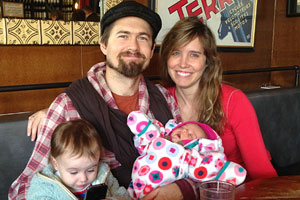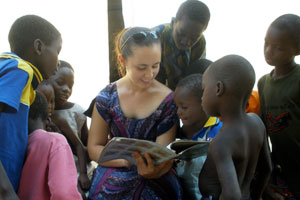

Following Her Personal Script
Former Actor in Real-Life Role: Emilie Jacobs, M.D.
For Emilie Jacobs, the path to a medical degree has been so filled with dramatic twists you might think it the stuff of a Hollywood movie.

Ms. Jacobs with husband Rowan and daughters, Elias and Zia.Ms. Jacobs, 36, is a former television and film actor who began her career at age 11 and appeared in blockbusters with the likes of Walter Matthau and David Straithairn. As a child, she lived in Korea, the former Yugoslavia, and the Philippines before her family moved to rural Georgia. She also has worked to obtain whistleblower protection for international volunteers—a campaign she helped launch after her cousin, a member of the Peace Corps, was murdered in the West African country of Benin.
And in May, Ms. Jacobs will receive an M.D. degree from Einstein.
"I've been blessed with a life that has invited contrasts," she wrote in her application to the Montefiore-Einstein Center for Bioethics, from which she will earn a master's degree. The contrasts have often been profound.
From Arts to Science
Watch Emilie and her classmates during Match Day 2014"I came by the arts naturally. My family included a lot of artists and educators. But there was always another part of me that was looking for something else. I always felt there was a missing piece," said Ms. Jacobs. She earned an undergraduate degree in film studies at Columbia University, but the piece was still missing. "I was getting bored, I wasn't feeling fulfilled."
The void grew when her mother was diagnosed with cancer. "I became completely absorbed in her care," she said. From research protocols to ICD-9 codes to nursing shift changes, she was determined to learn all she could. "I felt I had to know the language of medicine, to crack its code, in order to best care for my mother, to try to save her life."
Ultimately, that effort was successful. But along the way, Ms. Jacobs had learned something else: working in medicine might provide the missing piece.
Pursuing Medicine
"I came into contact with so many great people, so many great role models," she said of that time. And medicine, she felt, suited her personality. "The job of being a physician requires problem-solving based on a body of knowledge that fascinates me. It's about real-life human interaction and lifelong discovery. It serves an essential need in the world."
Eager to learn, Ms. Jacobs completed a post-baccalaureate, pre-medicine program at the University of California, Los Angeles, and then began her studies at Einstein. But again, a devastating turn of fate soon changed her life.
In March 2009, her cousin, Kate Puzey, was slain after reporting suspicions that a Peace Corps contractor in Benin was abusing young schoolchildren. The contractor was fired, and authorities believe he killed Ms. Puzey in retaliation—although he has not yet been brought to trial. The tragedy inspired Ms. Jacobs and other family members to found Kate's Voice Action Network, a group that advocates for the protection of Peace Corps volunteers, and successfully fought for federal legislation changing the agency's policies and procedures.

Ms. Jacobs’ cousin Kate, in Benin, with children from the local village."I guess the way I deal with grief is to be industrious, to work hard and try to make things a little better," Ms. Jacobs said. "In Kate's case, I wouldn't have forgiven myself if I hadn't tried to do something."
Today, Ms. Jacobs credits other family members with continuing and expanding the work of Kate's Voice, while she prepares to debut this fall in a new role—a resident in internal medicine at St. Luke's-Roosevelt Hospital.
Choosing a Discipline
She was drawn to her specialty after completing her first clinical rotation at Montefiore Medical Center.
"I love that internal medicine allows you to be part of the entire healing process," she said. "From emergent situations, where you're doing detective work to figure out why a patient is ill, to the ongoing work to keep a patient well, you're part of it all. I think it's important to have a holistic view of health, and internal medicine helps give you that."
Ms. Jacobs takes a similar broad perspective on the real-world roles she has played. Now a married mother of two, she laughingly calls herself "one of the older students" and said she values the diversity of her own life—and of her classmates'.
"Becoming a doctor is so consuming, so rigorous, that it's easy to focus too narrowly," she said. "I'm fortunate that I've been able to have time to reflect, to think about who I am and who I want to be.
"No matter where we've come from or what we've done, I think we've all gotten into medicine out of the human desire to help people. That's a good thing to remember."
Posted on: Thursday, April 17, 2014


